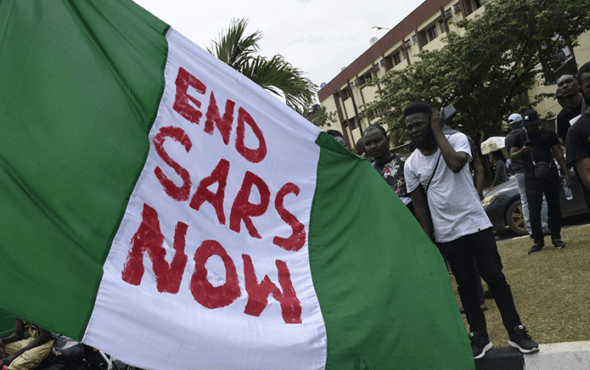
Protests against the horrific police brutality actioned by Nigeria’s SARS (Special Anti-Robbery Squad) are taking place online and across the globe. Here’s what you need to know about the fight to end SARS.
For the last two weeks, the streets of Nigeria have been packed with protesters who are taking a stand against normalised police brutality. If you’re unfamiliar with what has been going on, here’s a quick breakdown of what’s been happening.
What is SARS?
SARS is a unit that was first put together in 1992. As an undercover task force, it was aimed at tackling crime and protecting the public, but instead, it has become synonymous with oppression, human right violations as well as accusations of assault, illegal detentions and shootings.
While the SARS unit was disbanded by President Buhari on 11 October, the trauma left by the task force has reached a breaking point. Now, following the death of a young man in Delta State earlier this month, tensions between protesters and police have peaked.
Why are people protesting?
Nigerians have long been protesting the horrific treatment by the unit. Reports as early as 2016 establish how the SARS unit systematically exploited and leveraged their powers over civilians. Harrowing cases emerged spotlighting how detainees were tortured and had to offer bribes in exchange for their freedom. In some cases, SARS officers were known for stealing and confiscating property from detainees.
As fresh attention is being paid to the this pressing issue, protests and online updates are being shared across the internet. Hashtags such as #EndSARS and #EndPoliceBrutalityinNigeria have become vital resource points for users online to track news stories, and tweets from Nigerian activists on the ground.
Today, it was revealed 12 people were killed by the Nigeria army while peacefully protesting police brutality at Lekki toll gate, Lagos, Nigeria.
Following recent events, hundreds have come together, online and in person, to call for an end to police brutality. The Nigerian youth have become a vocal demographic taking a stand to the ongoing tyranny as SARS officers would reportedly single them out.
Many of these victims have been targeted by SARS officers and harassed due to their lifestyle which could be identified by what car they are driving or if they are in possession of a laptop.
Within this younger demographic, the LGBTQ+ community are particularly vulnerable. Nigeria does not recognise the freedom or rights of queer people. The young queer youth are often identified based on factors of appearance or presumptions based around behaviours.
“Yell it in your streets. We get killed for being queer. It’s crazy,” radical feminist and LGBTQ+ identifying activist Matthew Blaise tweeted.
Yell it in your streets. We get killed for being queer. It’s crazy pic.twitter.com/KIGaaGbKk7
— Son of the Rainbow AKA LGBTQ+ CLASS CAPTAIN🏳️🌈 (@Blaise_21) October 10, 2020
How can you help?
Although the news of what is taking place in Nigeria has been actively reported over the last few weeks, this may be the first time you’re hearing of it. We’ve included a list of resources and important information links, threads, and tips on how you can show support during this time.
If you can spare the money, @feminist_co on Twitter have made a call for donations using Bitcoin. The coalition group formed in July 2020 and have described their mission to “champion equality for women in Nigerian society with a core focus on education, financial freedom and representation in public office”.
In the post below, the group of young Nigerian feminists platform a free, secure method of donating money which also open to international donations which will which go to helping those impacted.
We're moving to only accepting donations in Bitcoin using BTC Pay. BTC Pay is a free, secure, decentralized and censorship-resistant platform, which makes it our best option, given the past few days #EndPoliceBrutalityinNigeria
Please donate here: https://t.co/FvsEKetUL9
— feministcoalition (@feminist_co) October 15, 2020
If you can’t afford to donate money, then share content which will help educate yourself and other on what is happening. Safe Hquse have put together a compact list of how you can support LGBTQ+ Nigerians. You can also access the information in the tweet below:
We know you may be anxious, scared, numb, overwhelmed. Slowly inhale & exhale. If you can't support us with financial donations. That's fine. READ THIS! #Lekkitollgate
“HOW ELSE CAN I SUPPORT SAFE HQUSE BESIDES FINANCIAL DONATIONS?” by SAFE HQUSE https://t.co/I2vXsNuYt8
— Safe Hquse 🏳️🌈🇳🇬 (@SHquseNG) October 21, 2020
Assata Collective are an organisation also sending funds to support queer and trans people protesting brutality and injustice in Nigeria. Their tweet below highlights how you can get involved.
#EndSarsNow #EndSARS #EndSarsProtests #SarsMustGo #SARSMUSTENDNOW #SARAMUSTEND #EndSWAT #EndPoliceBrutalityinNigeria #queerlivesmatter #WarriProtest #EnuguEndSarsProtest #enuguprotest #enuguprotests #AbujaProtests #AbujaProtesters #BuhariHasBeenABadBoy #BuhariMustGo #SWAT pic.twitter.com/k6OFmGxZ61
— AssataCollective (@AssataCollectiv) October 14, 2020



